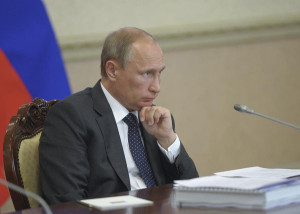Russian President Vladimir Putin has called for retaliation against E.U. and U.S. sanctions targeting Russian banking, oil and defense industries.
This comes as Russian troops mass on Ukraine’s border, raising fears of an invasion.
Follow Tom Barton on Twitter @TomBartonJourno

Russia poised to retaliate for sanctions
A Russian lawmaker has asked for an investigation into Burger King and KFC products, and McDonald's has been targeted by two separate Russian government controlled inspection agencies.Russian Prime Minister Dmitry Medvedev has threatened retaliation for the grounding of a subsidiary of national airline Aeroflot because of E.U. sanctions, with a Russian newspaper reporting that European flights to Asia over Siberia could be banned.
And more responses might be on the way, according to President Putin.
“The Russian government has already proposed some retaliatory measures to the so-called sanctions imposed by some countries. I think in the current situation in order to provide (with work) local producers we could think about it.”
Russia’s state-controlled food watchdogs have added Romanian beef and cattle imports to the list of banned foreign food, which already includes Ukrainian dairy products and soybeans and Polish fruit and may extend to more European produce and U.S. chicken.
And there are other signs that the West have been targeted. A Russian lawmaker has asked for an investigation into Burger King and KFC products, and McDonald’s has been targeted by two separate Russian government controlled inspection agencies.
A number of Russian tourist firms have collapsed, they say because of a recommended travel ban on employees of Russia’s law and order apparatus over security concerns caused by the Ukraine crisis. And a slowing of the Russian economy could cause hurt Vladimir Putin’s domestic support.
As NATO raises fears of an invasion amid a reported build-up of 20,000 Russian troops along Ukraine’s border, Moscow speaks of what it calls a “humanitarian situation” in Ukraine.
 CGTN America
CGTN America
